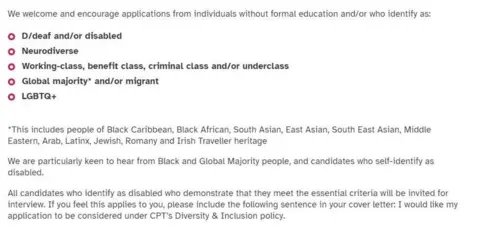Entertainment
Camden People’s Theatre removes ‘offensive’ job advert language

 Google
GoogleA north London theatre has removed a series of “offensive” phrases from its job adverts, including “benefit class, criminal class and underclass”.
Camden People’s Theatre used the language in two recent job adverts posted on X, formerly Twitter.
The theatre said it was reviewing the phrasing it uses to “encourage and support access, diversity and inclusion”.
Some of the terms prompted criticism from the UK’s first professor of social mobility, who says the terms “position people as inferior”.
A theatre spokerperson said: “There has been concern raised over some of the language we used in a recent job advert and some people have found it offensive.
“As a result, we are reviewing the language we use to encourage and support access, diversity and inclusion.”
They added: “For now, we have removed the language from our job adverts that has caused offence and we will update it once we’ve had the opportunity to consult more widely with our artists and partners including those with expertise in using inclusive language.”
 Camden People’s Theatre
Camden People’s TheatreUnder discrimination law, employers must not state or imply in a job advert that they will discriminate against anyone.
Lee Elliot Major, professor of social mobility at the University of Exeter, previously said of the wording: “We need to carefully consider the language we use when promoting opportunities for people who have faced extra barriers and challenges in life.”
‘Unfairly stereotype’
He added: “I would certainly avoid terms like ‘criminal class’ or ‘underclass’, which immediately position people as inferior, when they often have a lot to offer.
“This is about moving away from harmful deficit approaches which lead us to unfairly stereotype and label people.”
A spokesperson for Arts Council England said it was aware of the wording used by Camden People’s Theatre and was in “regular contact” with the organisation.
It says while it reserves “the right to be involved in the recruitment process for senior roles at all National Portfolio Organisations”, the leadership and board of an organisation “remain responsible” for “operational and day-to-day management” of activities.











